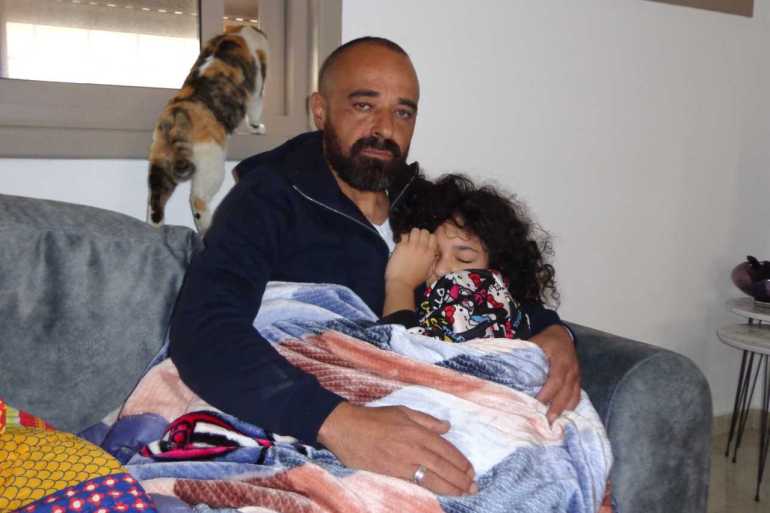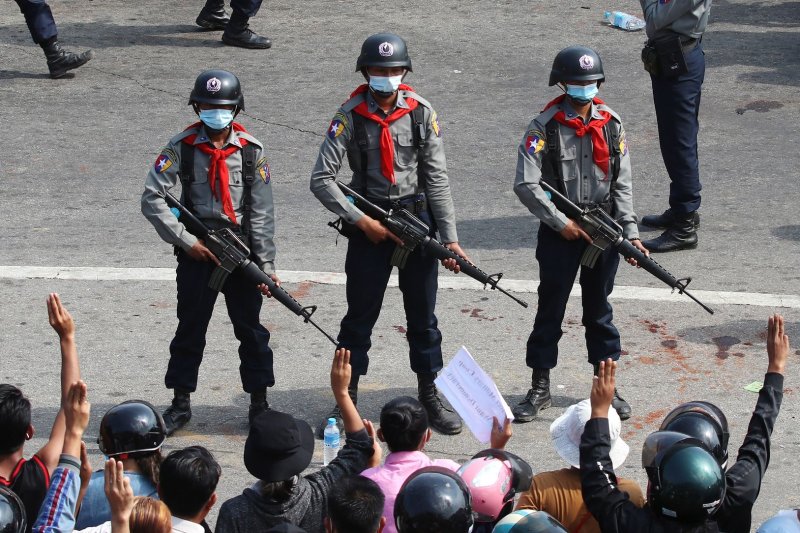Israel is taken to the International Criminal Court as it continues to demolish Palestinian homes in the occupied territories.

By Al Jazeera Staff
Published On 29 Jan 2022
Beit Hanina, Occupied East Jerusalem – Nine people were injured and journalists were attacked by Israeli security forces this week as the Jerusalem Municipality demolished a two-story building and home of the Karameh family in the East Jerusalem suburb of Abu Tor on the pretext of being constructed without a building permit.
The family of 15 was forcibly evicted by Israeli police while six of those injured required hospitalisation, according to the Red Crescent. Hundreds of Palestinians are facing forced expulsion from homes in East Jerusalem, which Palestinians want to be their future capital.
But one family, the Salhiyehs, is taking the Israeli authorities to the International Criminal Court (ICC) after they were evicted from their home in Sheikh Jarrah in East Jerusalem last week, and the subsequent destruction of their home by the Jerusalem Municipality.
“There is no justice, as an Israeli I don’t believe in my country any more. They have destroyed my life,” Lital Salhiyeh, 40, told Al Jazeera.
Last week Lital’s husband Mahmoud, 43, several of their sons and their friends staged a demonstration on the roof of their house in Sheikh Jarrah, threatening to blow themselves up with a gas canister after the Israeli authorities attempted to evict them from the home they have lived in for decades.
Several days later, during a cold and rainy night, Israeli special forces raided their home, arrested them at gunpoint, and beat them up. They were taken to prison for several days before their lawyer secured their release on bail.

While Mahmoud was in jail their home was destroyed by the municipality, leaving 18 people homeless.
“The police drove me past my destroyed home the next morning and showed me what they had done. We were not informed that the home would be destroyed,” Mahmoud told Al Jazeera.
“Mahmoud and I knew that the eviction order was against us personally but not the rest of the family and neither was there a demolition order against our home,” said Lital from the home they have temporarily rented in the East Jerusalem suburb of Beit Hanina.
“We lost everything and left with only the clothes on our back. I don’t even have pictures of my children,” Lital, who has been married to Mahmoud for 23 years, said. The couple has six children.
A family agricultural nursery, where Mahmoud worked, and ancient olive trees on their plot of land were also destroyed.
Lital, an animal lover, managed to rescue some of the family pets who were left stranded in the rain and cold after the family’s home was demolished.
It was the second time the Salhiyeh family has been made refugees. In 1948 they were expelled from their home in the village of Ein Karem during the Arab-Israeli war.
In 1984 Jerusalem Municipality’s district planning committee approved a building plan for the Sheikh Jarrah neighbourhood and designated the plot on which the family home and nursery were built for public building – even though other public areas can be found for this purpose without requiring the eviction of a family home.
In July 2017, the municipality announced the expropriation of the plot of land, which Mahmoud’s parents purchased in 1958.
The landowners filed an objection to the expropriation, but the court approved the expropriation and dismissed the objection.
‘Looking at all the details’
Critics argue the Israeli authorities are trying to Judaise East Jerusalem in favour of a higher Jewish demography.
However, the Salhiyeh family is defiant and plans to take the Israeli authorities to the ICC in addition to launching an international campaign highlighting the case and those of other Palestinians facing eviction and home demolitions in East Jerusalem.
“On Monday afternoon we held a Zoom meeting with our lawyers in London, Bindmans Solicitors, who are partnering with the International Centre of Justice for Palestinians [ICJP], in representing several other Palestinian families from Sheikh Jarrah,” family lawyer Walid Abu-Tayeh told Al Jazeera.
“They are studying the documents and looking at all the details before deciding the next step and have been working on the case since October after we first consulted them. We don’t know when the case will be brought before the ICC but it could take a long time,” he said.
“What made this all possible was an announcement in 2019 by the ICC prosecutor of the opening of an investigation into whether crimes committed in Palestine after June 2014 fell within the jurisdiction of the court,” said Abu-Tayeh.
Expectations from ICC
In 2021 the Pre-Trial Chamber of the ICC concluded the court’s territorial jurisdiction extended to the territories occupied by Israel since 1967: Gaza and the West Bank including East Jerusalem.
“The ICC can now pursue Israel for war crimes,” said Abu-Tayeh.
“The ICC could rule that Israel needs to rebuild the demolished house; that senior Israeli government officials involved in the demolition and eviction could be arrested if they travel abroad; and that all Israel’s actions in the West Bank such as land theft, the behaviour of the settlers, and other human rights abuses could also fall under the ICC’s jurisdiction so that individual settlers can be sued as well as collectively.”
The Salhiyehs are taking other legal action as well.
“We have also been in contact with several American senators in both the Senate and the Congress in regards to taking up our case to kick off an international campaign against the home demolitions and the evictions, and my brothers in the US are in contact with several law firms there too,” Abu-Tayeh said.
East Jerusalem is illegally occupied under international law. The “extensive destruction and appropriation of property, not justified by military necessity and carried out unlawfully and wantonly” amounts to a grave breach of the 1949 Geneva Conventions and is considered a war crime, according to the 1998 Rome Statute of the ICC.
Tensions have been building elsewhere in East Jerusalem, where Palestinians are either in the process of being displaced or have already been made homeless.
Last week Israeli and Palestinian peace activists were attacked by Israeli security forces as they protested the pending eviction and destruction of the Salem family home.
An Israeli settler who pulled a gun on the protesters was arrested.
Hatem Abdel Khader, the Palestinian Authority’s former minister for Jerusalem, and who now coordinates Muslim and Christian efforts on behalf of the PA to prevent the Judaisation of East Jerusalem, told Al Jazeera the home demolitions and evictions were inflammatory and dangerous.
“These are raising tensions and could provoke severe consequences. The international community needs to take action and the international courts have to get involved in the fight,” said Khader.
Mahmoud Salhiyeh said he knows the battle ahead is going to be long and hard “but we won’t give up without a fight”.
Crispin Blunt, member of parliament and director of the International Centre of Justice for Palestinians, said the Sheikh Jarrah case was already notorious.
“ICJP is proud and privileged to stand alongside this family as they represent not just their own interests, but the century of historic injustice meted out to the Palestinian people individually and collectively,” he said.
“For Israel’s sake, for all Palestinians and for humanity’s sake, the Sheikh Jarrah case needs to be a turning point where justice and our common humanity starts to count for more than people’s insecurities driven by fear.”
SOURCE: AL JAZEERA


















